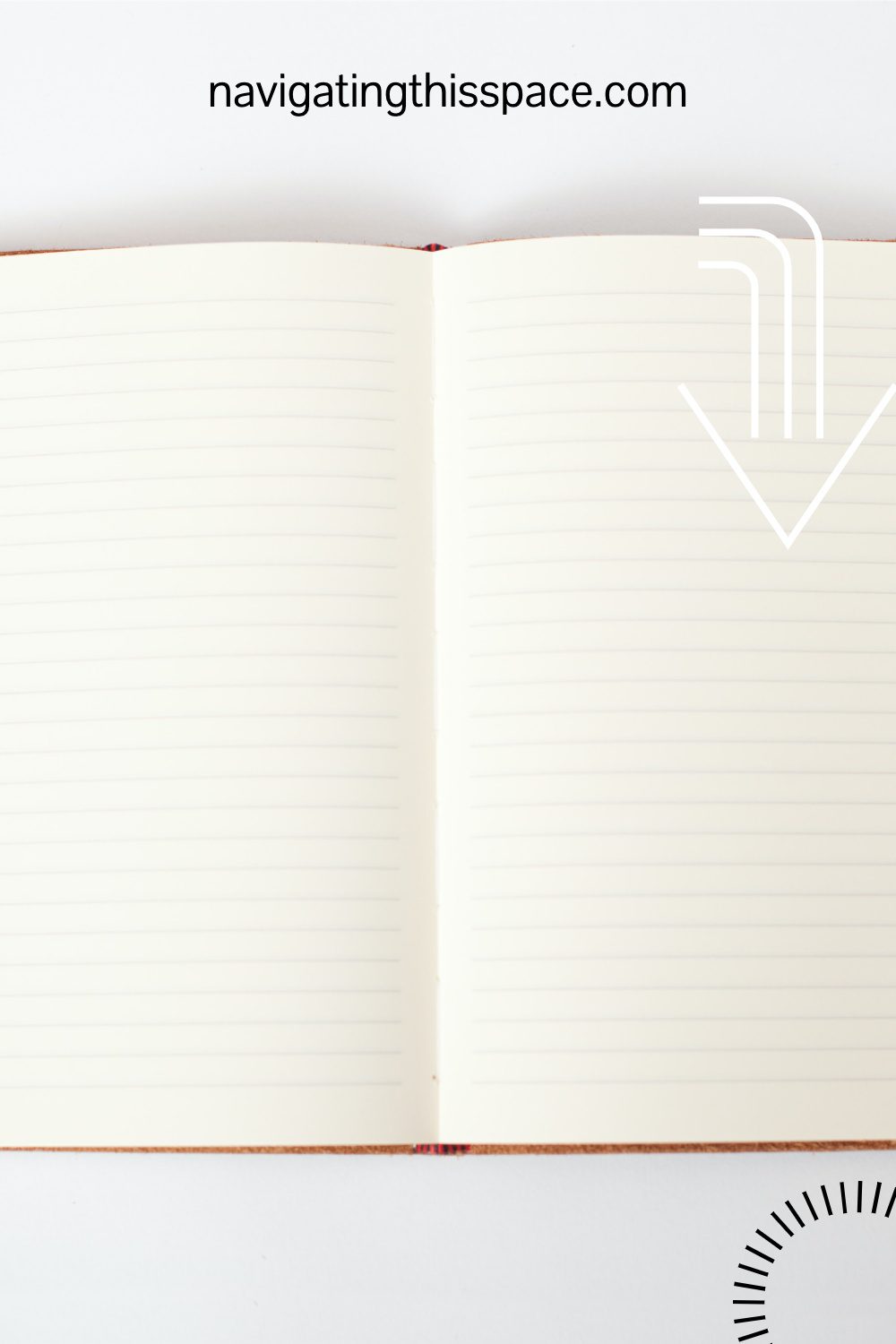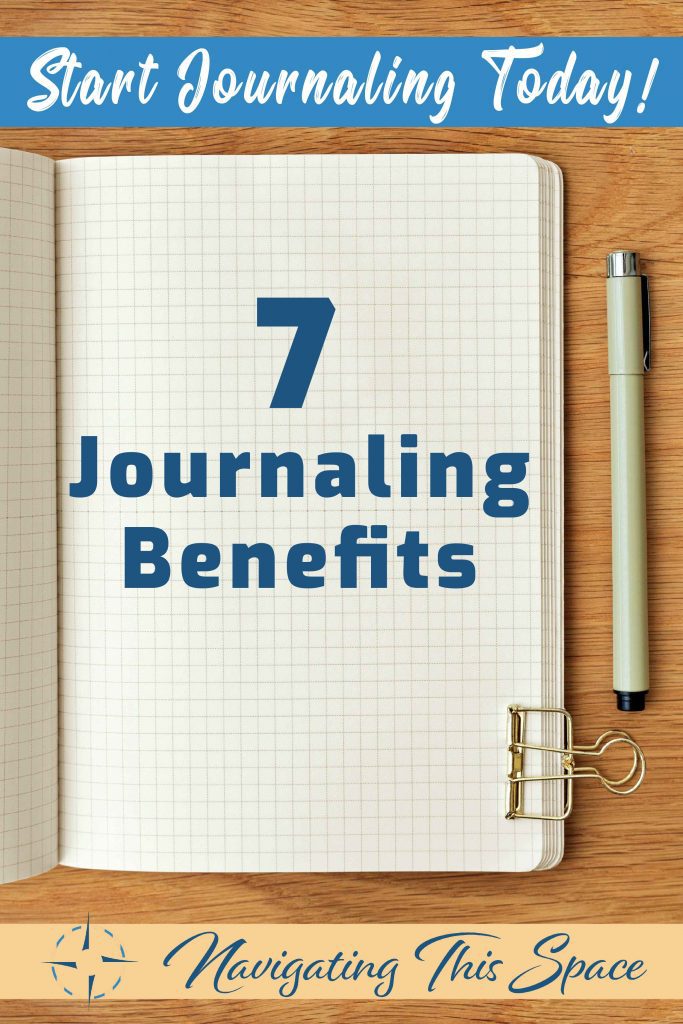Journaling is a great way to manage your thoughts, emotions, and goals in life.
It is also a form of therapy that helps you deal with any current and past traumas in your life by writing about them.
From higher self-awareness, creativity, and improved moods to lower stress, anxiety, and depression, journaling has countless benefits to offer.
The next time you find yourself in a situation where you’re feeling stressed or anxious: take out your journal, grab a pen, and start writing!
Here are 7 surprising benefits of journal writing that you may not be aware of.
The Benefits of Journaling
The benefits of journaling can be experienced—long-term and short-term— in just about any aspect of your life!

A lot of research has been done on the effects of journaling, and it is confirmed that people who have a regular schedule of writing in journals feel better, have a higher level of self-awareness, and overall improved mood.
1. Develops Self-Awareness
Self-awareness is the ability to have an objective view of yourself and your behavior.
It also includes a deeper understanding of who you are, what motivates you, and what triggers your thoughts, feelings, actions, and reactions. Basically, it’s an overall understanding of what makes you tick.
The more self-aware you are about yourself, your habits, and your behavior, the easier it will be to achieve any goal you set for yourself.
Journaling allows you to become more in touch with your emotions, thoughts, and feelings.
It also helps you identify any harmful responses that you may have (anger issues and depression) to start working on them and improve your mental well-being as a whole.
If you intend to get to know yourself better, then it’s time you pick up a journal and dive deep into your mind.
“To know thyself is the beginning of wisdom.”— Socrates
2. Boost Memory

Whenever you see, hear, and write something, you engage your sense organs.
Writing about things creates motion that generates energy called kinetic energy. This energy helps your brain remember things more clearly, resulting in better memory retention and recall than doing other activities alone like talking, reading, or listening.
Not only is journaling good for helping you remember something, but it also improves your ability to think more lucidly.
When you’re journaling or writing about an event that happened in your life, it’s easy to get lost in your thoughts and start thinking about what that situation means to you.
Once you start to analyze the event you’re writing about, small details start to stand out, allowing you to have a strong visual memory. Writing down these memories indicates to your brain that this situation is important and should be stored away with your other memories.
This simple act of writing down your memories, thoughts, and feelings boost your memory retention rate!
If you’re having trouble remembering what you ate for breakfast today, try jotting it down, you may have been on auto-pilot to get through your mornings.
Auto-pilot removes your awareness of your present moment, which can put you in danger of missing valuable information to better your life.
“The simple act of paying attention can take you a long way.”—Keanu Reeves
3. Achieving Goals

Keeping a journal is a great way to achieve your goals by organizing your thoughts, which allows you to focus on what’s important. It removes the fluff.
Journaling helps you to track your progress.
The act of writing things down creates data that shows you how far you’ve come since the beginning of your goal project, the year, or even yesterday. It allows you to analyze things from different perspectives, which helps you clearly see what direction you should be heading in.
Writing down your goals as well as their obstacles allows you to reflect on:
1. The level of difficulty you’re facing, and
2. Creating a solution-based plan to break down those barriers to achieve your goals.
Journaling is a concrete progress report when working on a goal. It is a great tool to help you reach your goals and achieve things that were once thought to be unreachable.
Journaling helps you understand and enjoy the journey and the lessons you must go through to achieve your goals.
Journaling is just you, a pen, and your thoughts.
Sometimes it’s hard to see the big picture when you’re in the thick of things or are focused on only one part. Writing everything down allows you to look back at what’s happened so far and reflect on how far you’ve come and how far you need to go.
“It’s not the destination, it’s the journey.”― Ralph Waldo Emerson
4. Boost Creativity

Getting your thoughts down on paper helps you open your mind to more possibilities, inventive solutions, and creativity.
When you’re trying to solve a problem, journaling can help you remove barriers that prevent your mind from thinking freely and coming up with creative solutions.
Journaling unlocks your potential and allows you to explore avenues that you were too scared to venture into because of the fear of being judged. Because your journal is private, you subconsciously give your brain permission to think the craziest things without fear of embarrassment.
The ability to be creative is a sign that your brain is working properly, and with a healthy brain, your problems stand no chance of keeping you confused for long periods.
If you genuinely believe that you don’t have one creative bone in your body, it’s time to reflect on what you did as a child.
Were you drawing, singing, dancing, putting on plays, or writing and telling made-up stories? If so, then you were creative. You just lost touch with your creative side as you grew older.
Journaling allows you to get lost in a creative fantasy, which can stimulate your mind and lead to a higher level of thinking.
When you’re writing, your brain doesn’t see the lines on the paper and subconsciously thinks to itself, “Oh, this isn’t good enough!” Instead, it throws you every crazy thought in hopes that you’ll accept one and explore it further.
This leads to the next benefit journaling has to offer.
5. Clearer Mind

When you allow your mind to do a deep dive into all your thoughts, dreams, goals, and aspirations all the time, you’re putting yourself at risk of becoming overwhelmed. You’re more likely to create stress in your life by constantly entertaining this behavior.
Your brain is a very powerful computer, but it can only fully process one thing at a time.
Uncluttering your mind, releasing anxiety, and clearing your mind of negative thoughts are much easier to accomplish when you’re writing in your journal.
As you journal, all the mental clutter is being released, which creates room for clearer thinking. I believe this is one of the greatest benefits of journaling because it quiets the mind and opens up a clear path.
A great way to improve your mental health and free your mind from excessive thinking is to write your stream of consciousness when you’re beginning to feel overwhelmed.
Your stream of consciousness is every thought that’s running through your mind at the moment. Whatever you’re feeling, try to put it in words and write it down in your journal.
Sometimes you might have to draw what you mean, and that’s okay too. You’re the only person reading your journal, so it doesn’t matter if anyone else understands your words or drawings.
Indulge in expressive writing to help free your mind from crippling thoughts. You never know, you could start solving the problems that have been keeping you awake at night!
Journaling can be a form of meditation if you let it, so use it to your advantage. Use it to get in touch with your feelings and connect with what’s keeping your mind busy.
6. Improves Self-Esteem and Happiness

Keeping a journal improves self-esteem and happiness, which is a major boost for your mental health.
Focusing on the good things in your life will help you see there’s more to celebrate about life than you originally thought.
When you spend time journaling about your daily experiences, as well as all those little nuances that get you every time, you’ll begin to see a pattern. If you’re not satisfied with that pattern, you can change it without second-guessing yourself.
Journaling reveals the toxic cycles we unconsciously choose to experience over and over again.
I know you might be a little skeptical of how a journal can improve your self-esteem, and you have every right to be skeptical. Journaling only gives you as much as you’re willing to give it.
Keeping a journal for me has been life-changing. It has been the only outlet that got me out of some dark places where I truly believed all hope was lost.
You must be willing to learn everything about yourself with the same curiosity you have when learning about someone you’re romantically interested in.
In other words, date yourself, learn what makes you happy, and what lights a fire under your anger. Learn what brings you joy and what brings bliss into your life. Journaling can help unveil all of these things for you if you’re willing to put in the effort and time.
Taking 15-20 minutes every morning as you wake up or every night before bed can enlighten you to the life you’re living and show you how to make positive changes that can significantly improve your happiness and self-esteem.
Writing down all those things that make you angry, sad, anxious, or stressed out is a great way to release these feelings healthily.
Working through negative emotions and trauma with a safe outlet such as journaling opens up opportunities for you to meet your authentic self.
Meeting your authentic self is the ultimate reward on your lifelong journey. Journaling can help you get on the path and stay on that path to meet your authentic self.
The benefits of journaling reveal themselves over time, so don’t expect this journey to be easy or quick.
Remember that the most challenging part in journaling is getting started!
7. Improve Communication Skills

Journaling can be a useful tool for all areas of your life because it is an excellent self-reflection activity.
Covering a variety of topics about your life in your journal can help strengthen your communication skills.
To be a successful communicator, you must learn how to express yourself effectively.
Journaling allows you to do just that.
It gently pushes you to try to explain what you’re feeling onto its pages.
Focusing on articulating these emotions, thoughts, feelings, and struggles gets you in touch with what you’re really trying to say and how to say it.
You don’t have to be a writer to journal successfully. You just need to write what’s in your head, and you’ll become one step closer to understanding why you do the things you do.
If you struggle with expressing yourself in real life, give journaling a try!
It’s easier to express your opinions when they are written down than it is to communicate them aloud.
I’m a better writer than I’m a speaker, so I say this from personal experience.
Being a good writer isn’t something you’re born with. It’s a skill, something you learn and develop. Journaling is the best way to practice being a better writer, and in turn, you’ll become a better communicator.
What Does Journaling Do to the Brain?

According to the University of Rochester Medical Center, journaling manages anxiety, reduces stress, and helps people cope with depression.
Taking 15-20 minutes to focus on your thoughts and feelings can help improve cognitive performance, specifically memory.
Journaling helps your brain on several different levels. People who write down their thoughts typically have an increased ability to remember or focus as they can verbalize and process these thoughts through journaling.
Journalers also tend to have better emotional control typically due to their emotional intelligence gained through constant deep diving into their feelings and expressing what they’ve found on paper.
Journaling helps you to explore emotions that may not be obvious when you’re subconsciously avoiding them. Writing in a journal can also help prepare for stressful scenarios in the future, and helps with future planning.
An active brain is a healthy brain and journaling keeps your brain active and healthy.
Why Is It Important to Keep a Journal?
If you’re wondering if it’s beneficial to keep a journal, consider these benefits:
- Journaling allows you to gain perspective on how you’re feeling and provides a safe place for your thoughts to be expressed.
- Journaling makes it easier to keep up with emotions that might slip through the cracks in your day-to-day life.
- Writing helps you connect the dots between seemingly unrelated things in your life.
- Emotional intelligence and deep reflection are great benefits of journaling.
- Journalers have been known to experience better physical health due to their emotional intelligence and the ability to reflect on all aspects of their lives.
- Journaling can also help you learn how to handle new thoughts and emotions, as well as better understand your values and beliefs.
- Journaling helps people cope with stress, anxiety, sadness, and anger. It serves as an outlet for all the feelings that we hold in our daily lives.
Why You Should Start Journaling Today
 To write or not to write? That is the question.
To write or not to write? That is the question.
There are a variety of reasons why you should be journaling right now. All the reasons listed above are beneficial to your brain and will ultimately help you become a more successful, productive person who can face life’s daily challenges.
Journaling is absolutely free and takes only a few minutes each day. No matter how busy or stressed out you are, journaling should always be an easy task on your to-do list.
Relax your brain and release those thoughts; that should be your number one reason for starting your journaling journey today.
How to Get Started With Journaling
Grab a journal and a pen and start writing. Yes, it’s that simple, but if you want a more detailed how-to start journaling, here’s a great article for you to read.
The Benefits Are Astounding!
Journaling, journaling, journaling. I can go on and on about this topic, but since this post is already ridiculously long, I’ll end it with this last tip.
Journalers are typically more successful in life because they can reflect on their thoughts about themselves and their past actions without being self-conscious or judgmental of what they discover. So get a journal, grab a pen that feels great in your hand, bring them with you everywhere, and begin your journey!
You can find your favorite journal here on Navigating This Space. I’ve designed them just for you.
There’s no viable reason to hinder your personal growth and stunt your self-discovery journey. Jump into the world of journaling today, and get started now!
Happy Journaling!









I love to journal. So fun to read all of these benefits. Thank you for sharing!
Thanks for reading Heather!
I love journaling. It makes sense that it helps your memory too because I’m always taking notes. It makes things stick for me even if I never read the notes again. Very interesting post.
That’s one of my favorite benefits of journaling Deanna. Memory on point!
The self awareness piece is so big! Its crazy how even short journal entries about how we feel or reflecting on the day can show you soooo much about yourself!
The things we learn about ourselves when we start to pay attention is just amazing Deanna, thanks for reading!
I love writing in my journal every night before I go to bed so I can let all the emotions out from during the day.
It’s great that you’re releaseing all those emotions Jimmy, keep it up and thanks for reading! I appreciate you!
I love journaling so much! This post reminded me that I really need to get back into my regular morning pages- it is amazing what can shift when you are facing yourself on the page every day 🤎
Hey Kelly May, get back to talking to yourself through your journal pages, you deserve all the wisdom your inner self has to share with you so don’t keep her waiting too long.
I’ve never been great at journaling but I can now see the many benefits of doing so.
Hey Dori, truth is, you don’t have to great at journaling to experience the benefits, all you need to do is write. Start with one minute per day and build from there
I have found so many of these benefits to be true.. thanks for the confirmation
You are very welcome Jennifer, thanks for reading!
These are great benefits! I am really inconsistent in my journaling, but I find if I slack off too much, I start to miss it and have random thoughts. Thanks for sharing!
Life happens Katie, as long as you don’t stay away too long you’ll be fine. Thanks for reading!